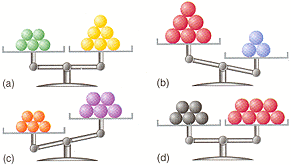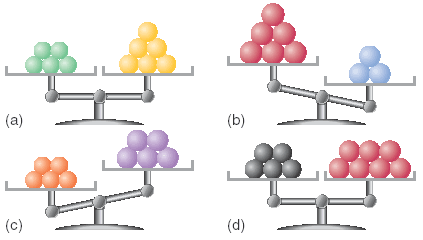Chemistry
10th Edition
ISBN:9781305957404
Author:Steven S. Zumdahl, Susan A. Zumdahl, Donald J. DeCoste
Publisher:Steven S. Zumdahl, Susan A. Zumdahl, Donald J. DeCoste
Chapter1: Chemical Foundations
Section: Chapter Questions
Problem 1RQ: Define and explain the differences between the following terms. a. law and theory b. theory and...
Related questions
Question
A 30.2-gram sample of an unknown compound contains 23.8 grams of tin and 6.4 grams of oxygen. What is the compound's empirical formula?
Expert Solution
Step 1
| The atomic mass of Cl is 35.45 amu. What is the mass in grams of 3 mol of Cl atoms? |
| Silber4 3.001b.EOCP. |
| The atomic mass of Al is 26.98 amu. What is the mass in grams of 2 mol of Al atoms? |
| Silber4 3.002a.EOCP. |
| How many moles of C atoms are in 1 mol of sucrose (C12H22O11)? |
| Silber4 3.002b.EOCP. |
| How many C atoms are in 1 mol of sucrose (C12H22O11)? |
| Silber4 3.003.AP. , | |||
Why might the expression "1 mole of nitrogen" be confusing?
What change would remove any uncertainty?
For what other elements might a similar confusion exist? (Select all that apply.) Why?
|
| Silber4 3.003.EOCP. |
| "One mole of nitrogen" can be interpreted as one mole of nitrogen atoms or one mole of nitrogen molecules. |
| Silber4 3.004.EOCP. |
| Which is true for molecular mass and/or molar mass? |
| Silber4 3.005.EOCP. |
| Which is not true about the mole? |
| Silber4 3.007.AP. |
| Each of the following balances weighs the indicated numbers of atoms of two elements. Each part (a), (b), etc below refers to the corresponding balance.
(a) Which element has the lower molar mass?
(b) Which element has fewer atoms per gram? (c) Which element has fewer atoms per gram? (d) Which element has more atoms per mole? |
| Silber4 3.007a.EOCP. |
| Each of the balances below weighs the indicated numbers of atoms of two elements.
|
| Silber4 3.007b.EOCP. |
| Each of the balances below weighs the indicated numbers of atoms of two elements.
|
| Silber4 3.007c.EOCP. |
| Each of the balances below weighs the indicated numbers of atoms of two elements.
|
| Silber4 3.007d.EOCP. |
| Each of the balances below weighs the indicated numbers of atoms of two elements.
|
| Silber4 3.008.AP. |
| Calculate the molar mass of each of the following.
(a) SO2
[64.1] g/mol (b) N2O [44] g/mol (c) K2S [110] g/mol (d) C6H12O6 [180] g/mol |
| Silber4 3.008a.EOCP. |
| Calculate the molar mass of the compound:
Sr(OH)2
|
| Silber4 3.008b.EOCP. |
| Calculate the molar mass of the compound:
N2O
|
| Silber4 3.008c.EOCP. |
| Calculate the molar mass of the compound:
NaClO3
|
| Silber4 3.008d.EOCP. |
| Calculate the molar mass of the compound:
Cr2O3
|
| Silber4 3.009.AP. |
| Calculate the molar mass of the following substances.
(a) K2C4H4O5
[210] g/mol (b) P4O6 [220] g/mol (c) CuSO4 · 5 H2O [250] g/mol (d) Na2HPO4 [142] g/mol |
| Silber4 3.009a.EOCP. |
| Calculate the molar mass of the compound:
(NH4)3PO4
|
| Silber4 3.009b.EOCP. |
| Calculate the molar mass of the compound:
CH2Cl2
|
| Silber4 3.009c.EOCP. |
| Calculate the molar mass of the compound:
CuSO4 · 5 H2
|
| Silber4 3.009d.EOCP. |
| Calculate the molar mass of the compound:
BrF5
|
| Silber4 3.010a.EOCP. |
| Calculate the molar mass of the compound:
SnO2
|
| Silber4 3.010b.EOCP. |
| Calculate the molar mass of the compound:
BaF2
|
| Silber4 3.010c.EOCP. |
| Calculate the molar mass of the compound:
Al2(SO4)3
|
| Silber4 3.010d.EOCP. |
| Calculate the molar mass of the compound:
MnCl2
|
| Silber4 3.011.AP. |
| Calculate the molar mass of each of the following.
(a) SrH2
[89.6] g/mol (b) Fe(ClO4)3 [354] g/mol (c) C7H8 [106] g/mol (d) CuCl2 · 2 H2O [170] g/mol |
| Silber4 3.011a.EOCP. |
| Calculate the molar mass of the compound:
N2O4
|
| Silber4 3.011b.EOCP. |
| Calculate the molar mass of the compound:
C8H10
|
| Silber4 3.011c.EOCP. |
| Calculate the molar mass of the compound:
MgSO4 · 7 H2O
|
| Silber4 3.011d.EOCP. |
| Calculate the molar mass of the compound:
Ca(C2H3O2)2
|
| Silber4 3.012a.EOCP. |
| Calculate the mass in grams of 0.57 mol of KMnO4. |
| Silber4 3.012b.EOCP. |
| Calculate the moles of O atoms in 8.18 g of Mg(NO3)2. |
| Silber4 3.012c.EOCP. |
Calculate the number of O atoms in 8.1  10-3 g of CuSO4 · 5 H2O. 10-3 g of CuSO4 · 5 H2O. |
| Silber4 3.013a.EOCP. |
Calculate the mass in kilograms of 3.8  1020 molecules of NO2. 1020 molecules of NO2. |
| Silber4 3.013b.EOCP. |
| Calculate the moles of Cl atoms in 0.0425 g of C2H4Cl2. |
Step by step
Solved in 2 steps with 38 images

Knowledge Booster
Learn more about
Need a deep-dive on the concept behind this application? Look no further. Learn more about this topic, chemistry and related others by exploring similar questions and additional content below.Recommended textbooks for you

Chemistry
Chemistry
ISBN:
9781305957404
Author:
Steven S. Zumdahl, Susan A. Zumdahl, Donald J. DeCoste
Publisher:
Cengage Learning

Chemistry
Chemistry
ISBN:
9781259911156
Author:
Raymond Chang Dr., Jason Overby Professor
Publisher:
McGraw-Hill Education

Principles of Instrumental Analysis
Chemistry
ISBN:
9781305577213
Author:
Douglas A. Skoog, F. James Holler, Stanley R. Crouch
Publisher:
Cengage Learning

Chemistry
Chemistry
ISBN:
9781305957404
Author:
Steven S. Zumdahl, Susan A. Zumdahl, Donald J. DeCoste
Publisher:
Cengage Learning

Chemistry
Chemistry
ISBN:
9781259911156
Author:
Raymond Chang Dr., Jason Overby Professor
Publisher:
McGraw-Hill Education

Principles of Instrumental Analysis
Chemistry
ISBN:
9781305577213
Author:
Douglas A. Skoog, F. James Holler, Stanley R. Crouch
Publisher:
Cengage Learning

Organic Chemistry
Chemistry
ISBN:
9780078021558
Author:
Janice Gorzynski Smith Dr.
Publisher:
McGraw-Hill Education

Chemistry: Principles and Reactions
Chemistry
ISBN:
9781305079373
Author:
William L. Masterton, Cecile N. Hurley
Publisher:
Cengage Learning

Elementary Principles of Chemical Processes, Bind…
Chemistry
ISBN:
9781118431221
Author:
Richard M. Felder, Ronald W. Rousseau, Lisa G. Bullard
Publisher:
WILEY


